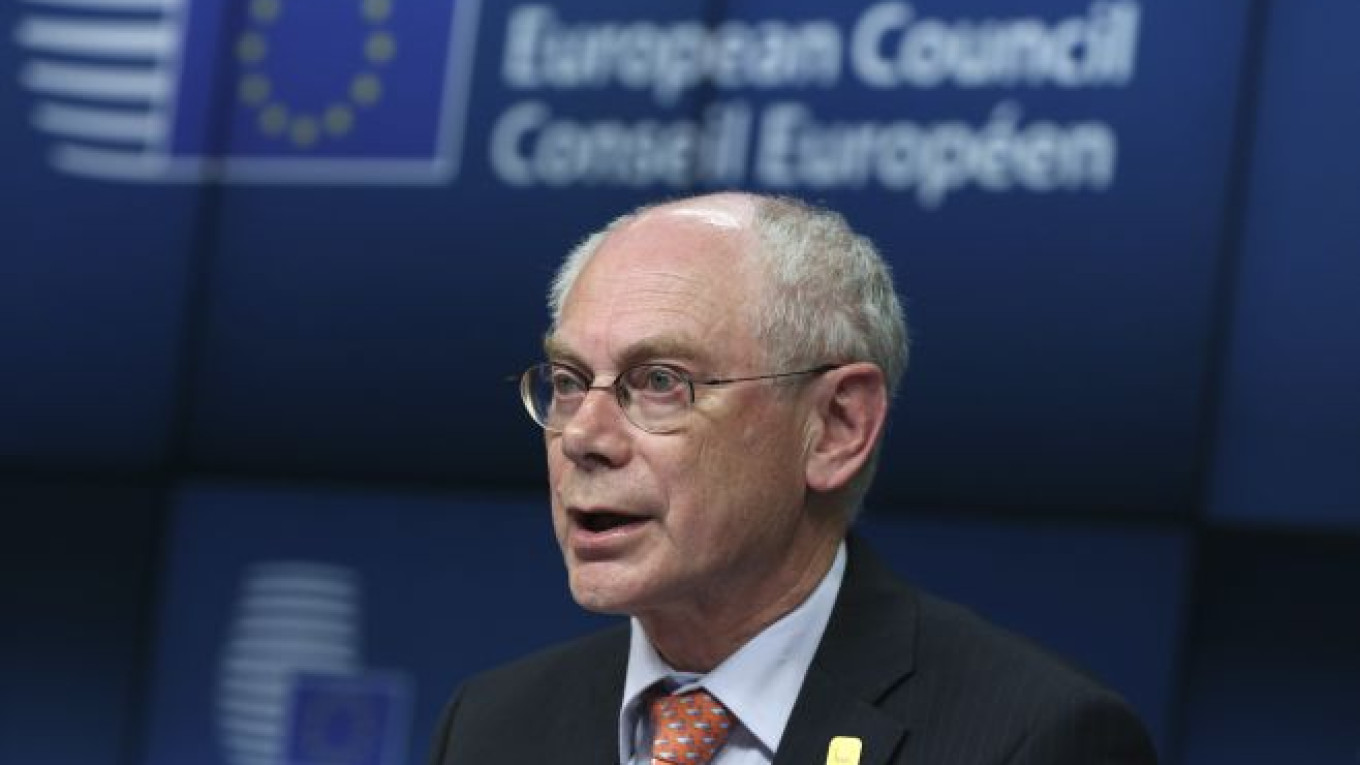BRUSSELS — EU diplomats have reached a preliminary agreement on a list of associates of Russian President Vladimir Putin and companies that will face sanctions as part of tougher measures over Moscow's actions in Ukraine, EU sources said.
During more than three hours of talks on Monday, they also agreed on new measures to restrict trade and investment in Crimea, which Russia annexed from Ukraine earlier this year.
Diplomats will hold more talks on Tuesday to try to forge an agreement on broader economic sanctions on Russia, targeting capital markets, defense and sensitive technology, provided all 28 EU member states can agree.
Speaking on condition of anonymity, the sources said they could not give full details of the new list, which is expected to be published late Wednesday, and is in addition to 87 people and 20 organizations already subject to EU sanctions against Russia.
Two diplomats said the new list contained fewer than 12 names in total and one said there were eight names and three entities.
The trade and investment restrictions that were agreed in principle on Monday would ban investment in certain sectors in Crimea, including infrastructure and the energy sector. They would also ban the export of equipment to those sectors in Crimea.
After months of hesitation, EU resolve to punish Russia strengthened after the downing in Ukraine earlier this month of a Malaysia Airlines passenger plane, killing all 298 people on board.
Western leaders say pro-Russian rebels almost certainly shot the airliner down by mistake with a Russian-supplied surface-to-air missile. Moscow has blamed Kiev for the tragedy.
Of those who died, 194 were from the Netherlands and the grief and anger of the Dutch people marked a turning point in the European Union's attitude to Russia.
Still, EU diplomats say they cannot be expected to impose measures as tough as the U.S. has agreed given the risk of pushing fragile EU economies back into recession.
In a letter to EU leaders last week, European Council president Herman Van Rompuy said the proposed sanctions package "should have a strong impact on Russia's economy while keeping a moderate effect on EU economies".
There was "an emerging consensus," he said, on some key principles, including only targeting future contracts, which would leave France free to go ahead with the controversial delivery of Mistral helicopter carriers being built for Russia.
Another principle was that the EU would also only target sensitive energy technologies in the oil sector, avoiding Russian gas.
The EU is Russia's biggest gas market. Germany, as the biggest customer in volume terms relies on affordable gas for its huge industrial sector.
"One of the most complicated issues is new technology in the energy sector because every time anyone says the word energy, that makes countries like Germany nervous," one European source said on condition of anonymity.
See also:
German Government and Business Back Tougher Sanctions on Russia
A Message from The Moscow Times:
Dear readers,
We are facing unprecedented challenges. Russia's Prosecutor General's Office has designated The Moscow Times as an "undesirable" organization, criminalizing our work and putting our staff at risk of prosecution. This follows our earlier unjust labeling as a "foreign agent."
These actions are direct attempts to silence independent journalism in Russia. The authorities claim our work "discredits the decisions of the Russian leadership." We see things differently: we strive to provide accurate, unbiased reporting on Russia.
We, the journalists of The Moscow Times, refuse to be silenced. But to continue our work, we need your help.
Your support, no matter how small, makes a world of difference. If you can, please support us monthly starting from just $2. It's quick to set up, and every contribution makes a significant impact.
By supporting The Moscow Times, you're defending open, independent journalism in the face of repression. Thank you for standing with us.
Remind me later.


